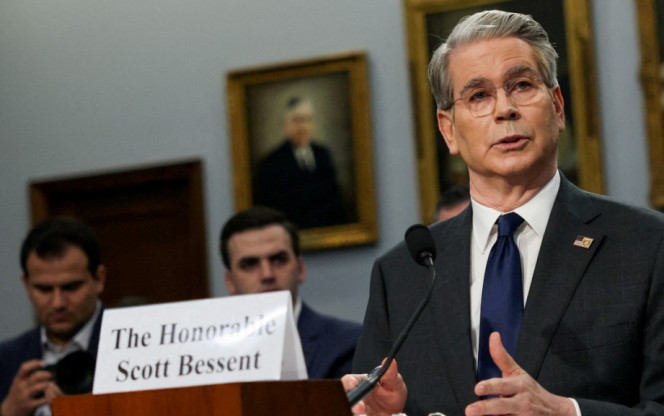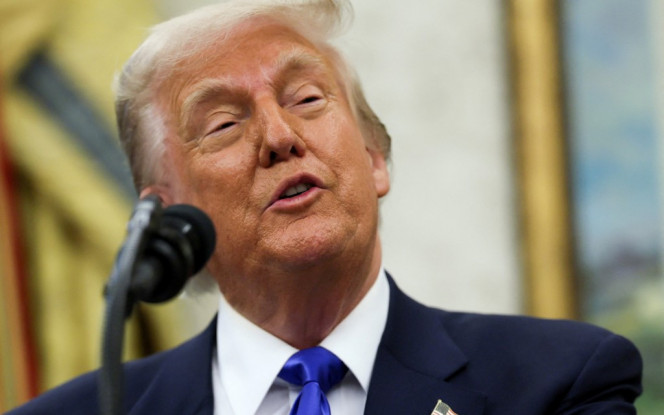US-Ukraine Reconstruction Investment Fund; Chinese Businesses Impacted in America; Chinese Operations in South China Sea; Volatile Oil Market; Nvidia Updates

U.S.-Ukraine Economic Collaboration: A Message to Russia
In a significant economic and geopolitical move, the U.S. and Ukraine have established the United States-Ukraine Reconstruction Investment Fund, marking a new phase in their bilateral relations. According to World Journal (source), this fund aims to bolster Ukraine's long-term sovereignty and prosperity, implicitly challenging Russian aggression. The fund aligns with U.S. Treasury Secretary Bessent's vision to support Ukraine's defense and reconstruction, projecting a message against war and for enduring peace.
The World Journal emphasizes the political symbolism of this initiative, something echoed by People's Daily (source), which highlights the strategic partnership to expedite Ukraine’s economic recovery. Such economic diplomacy indicates Washington's intent to limit Russian influence in Eastern Europe while reinforcing Western alliances.
According to another piece from United Daily News, the new fund showcases a deliberate stance in promoting ties amidst a complex global stage. The article highlights how fiscal collaborations with Ukraine underline the commitment to fostering a peaceful and prosperous relationship, beyond the immediate technology race, hinting at a strategy to fortify alliances in a changing global order. This narrative reveals a subtle yet persistent intent: to communicate a vision of lasting freedom and autonomy for Ukraine, while indirectly sending a bold message to Russia. Such diplomatic ballet resonates not just in the technology sector but equally in global political spheres, where economic relations often translate into strategic power.
U.S.-China Tariff Wars: Impact on Chinese Businesses in America
Amid heightened U.S.-China trade tensions, Chinese restaurants and supermarkets in the U.S. face substantial pressures due to increased tariffs. The BBC (source) reports that establishments like Kung Food and Niceday anticipate cost hikes as tariffs on Chinese imports rise to 145%.
This trade policy, implemented under Trump’s administration, affects the operational costs of these businesses, which partially rely on imported Chinese goods. Although some, like the Kung Food owner Yang Xiaochuan, remain optimistic about adapting, there's unavoidable concern about the knock-on effects on consumer prices and demand. This situation encapsulates the broader implications of U.S.-China tensions on local economies and consumer markets.
China's WTO Grievances: Criticism of U.S. Trade Policies
China has vocally criticized U.S. tariff policies at a recent WTO meeting, as reported by People's Daily (source). China argues that U.S. 'equal tariffs' disrupt global trade norms, branding the policies as protectionist and unilateral, which undermines multilateral trade systems.
According to China, these policies not only harm developing members' interests but also contradict the essence of global trade cooperation. By highlighting this at an international platform, China positions itself as a defender of multilateralism, debating against U.S.-centric trade practices that, in their view, threaten international economic stability.
These articles collectively show a complex global landscape, where economic policies intertwine with strategic international alliances and challenges. As countries navigate these dynamics, the implications reach far beyond immediate economic impacts, influencing broader geopolitical alignments and cultural narratives worldwide.
Maritime Enforcement: Chinese Operations in the South China Sea
An article from CCTV addresses maritime exercises conducted by the China Coast Guard around the Huangyan Island and surrounding waters. The narrative underscores China's commitment to protecting its claimed territories as part of its national sovereignty narrative. The article details activities such as patrols, surveillance, and issuing warnings against perceived intrusions, reflecting national priorities of territorial integrity.
Such stories are part of a broader pattern of state-run media emphasizing defense and sovereignty, likely aimed at a domestic audience to reinforce nationalistic sentiments and the government's strong positioning on territorial claims. These operations also signal to international observers China's unwavering stance on its maritime claims, influencing regional security perceptions and geopolitics.
Global Oil Market Volatility: The Forces Behind the Fluctuations
Recent weeks have seen international oil prices plummet, raising alarms across global markets. According to a comprehensive analysis from Sina, this volatility is deeply entangled with economic indicators from the U.S., where the economy has shown signs of contraction. The report notes a marked decline in the U.S. GDP for the first quarter of 2025, which attributed to a 0.3% annualized shrinkage—a stark contrast to historical norms.
This economic contraction is coupled with complex geopolitical dynamics where Saudi Arabia's apparent willingness to endure low oil prices has reshaped market perceptions. The Saudi signal to withstand lower prices without further production cuts demonstrates a strategic pivot aiming to consolidate market share rather than short-term price hikes.
Furthermore, the report outlines the impact of OPEC's unexpected production increase, exacerbating the already volatile market conditions. Such maneuvers underscore the oil market's susceptibility to geopolitical maneuvers and economic indicators, influencing energy prices worldwide and affecting everything from consumer pricing to industrial production costs.
President Trump's Interest Rate Commentary: Interpreting the Signals
In a recent statement, President Trump hinted at a divergence in opinion with Federal Reserve Chairman Jerome Powell on interest rate policy. As covered by Sina, Trump suggested rates should be decreased, highlighting his self-professed understanding of interest impacts on the economy—an assertion implying greater insight than Powell.
While the narrative might appear straightforward, the underlying implications are more nuanced. Trump's comments resonate with his administration's ongoing challenge in managing economic growth against a backdrop of trade tensions and potential market corrections. His stance signifies a pressure tactic on the Federal Reserve, favoring an economic stimulus through lower rates.
Such discussions echo beyond U.S. borders, as global markets monitor these policy debates closely, aware that shifts in U.S. monetary policy can ripple through financial systems worldwide, affecting currencies, trade policies, and capital flows.
Chinese Automakers: Navigating Profitability and Market Dynamics
The Chinese automotive industry is undergoing significant transitions, particularly in its embrace of new energy vehicles (NEVs). Recent data reveals that in 2024, eight leading automakers cumulatively recorded a net profit increase, demonstrating the sector's robust expansion capabilities. According to reports from Sina, companies like BYD and Geely have leveraged NEV production to achieve unprecedented profitability, overcoming traditional challenges faced by the industry.
BYD's standout performance, achieving a net profit of 42.4 billion yuan, reflects its strategic positioning, focusing on volume and market leadership in NEV development. This sector evolution underscores a strategic shift where traditional giants struggle with restructuring while newer players capitalize on their agility and innovation-driven models.
Given China's firm commitment to environmental sustainability and its supportive regulatory framework, these developments are pivotal. The shift not only highlights industrial strategy success but also indicates a microcosm of how technological innovation and policy alignment can drive industry-wide transformations globally.
Fiscal Strategies and AI Export Policies: A Complex Playground
The discussion on the evolving AI landscape often brings to light the thorny issue of export policies, as illustrated by Nvidia's CEO, Jensen Huang, who called out the governance on chip exports to China. A report from United Daily News quotes Huang's urging of the US government to rethink its AI policies, promoting the dissemination of AI technologies worldwide while balancing the competitive market dynamics with China. The article sheds light on the nuanced struggle between maintaining economic sovereignty and staying ahead in the AI race, particularly emphasizing China's rapid ascendancy.
In a related vein, the tension extends beyond mere economic concerns, as reported by Huang. The US's current policies include restrictions on Nvidia's advanced chip exports, which consequently impacts the global standing of US enterprises. By underlining the competitive proximity of China, the report further implies an implicit caution about the narrow divide between the two AI giants.
Domestic Manufacturing: The Test of Tech Superiority at Home
Nvidia's domestic savvy reinforces the company's resilience and adaptability. The company's plan to partner with Hon Hai to assemble AI servers near Houston exemplifies this, as depicted in the United Daily News article. This move not only brings manufacturing capabilities local but also supports the narrative of bolstering homegrown industrial strength. The emphasis remains on harnessing US resources and willpower to realize full-scale domestic production, a decision made apparent by Huang's remarks about achieving native manufacturing regardless of international friction.
The strategic pivot to lean into domestic capabilities serves as an intelligent assessment of the current geopolitical and economic arenas, acknowledging the subtle pressures and transforming them into foundational advantages. This approach aligns neatly with the US-led philosophy of reinforcing self-sufficiency while maintaining top-tier competitive edges in AI innovations.


